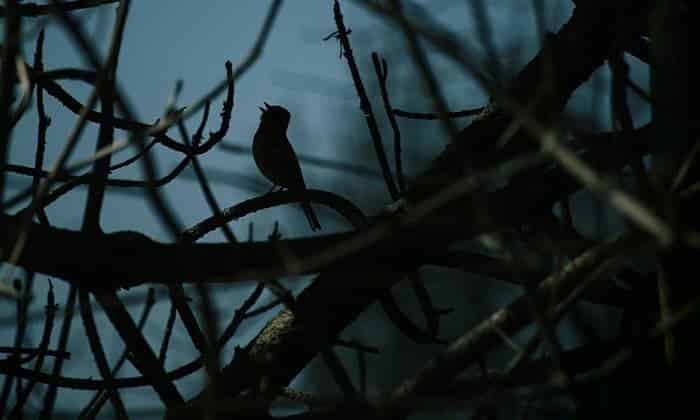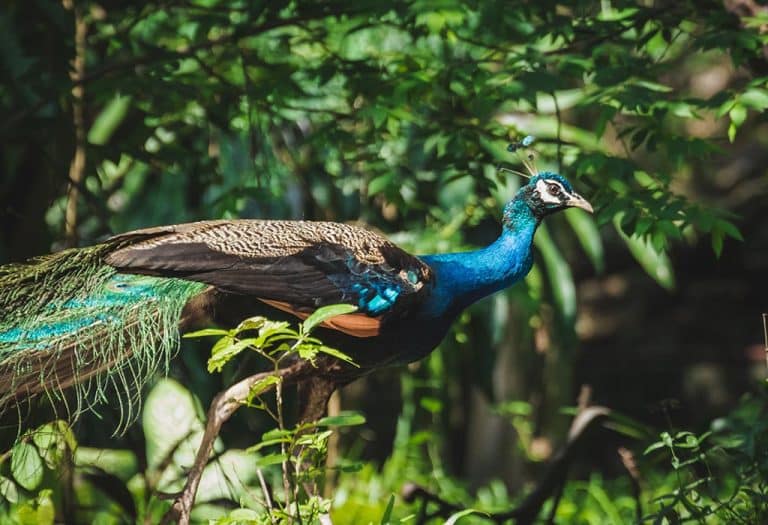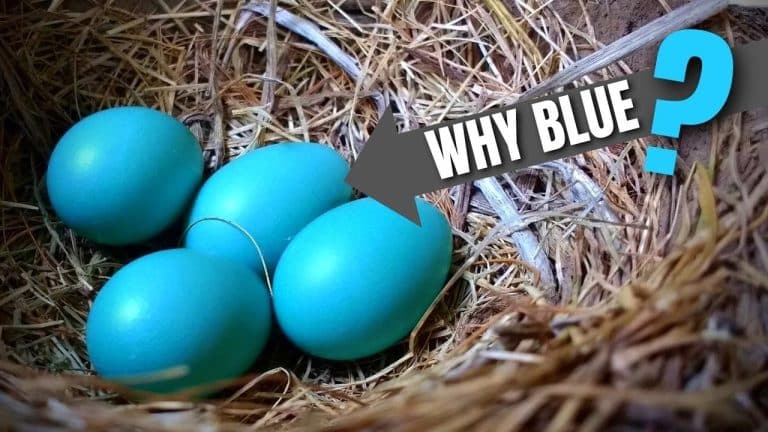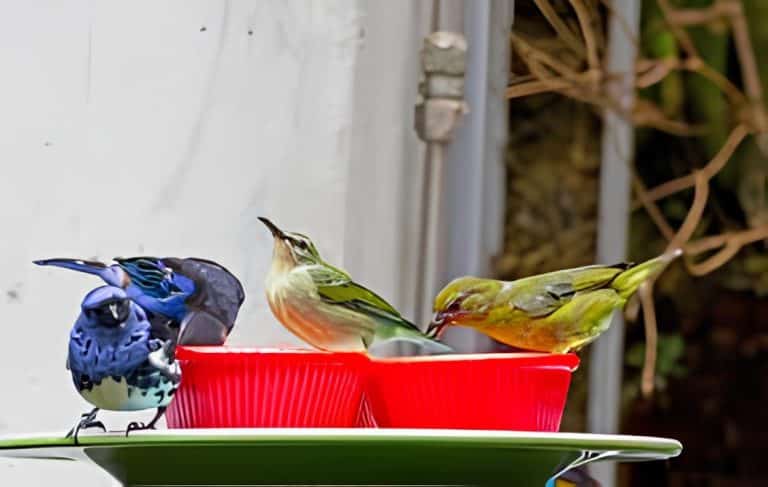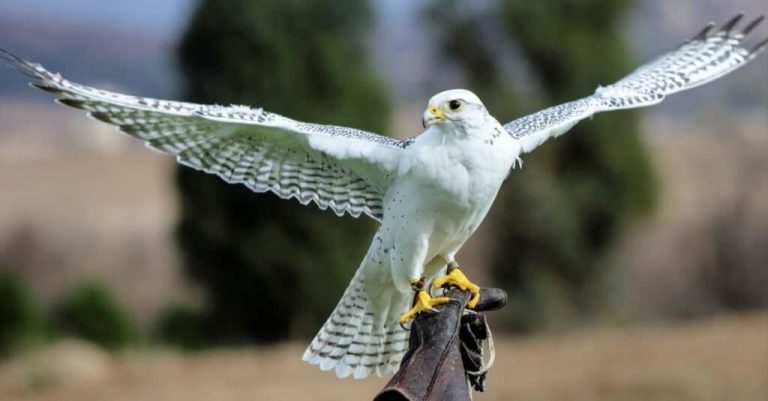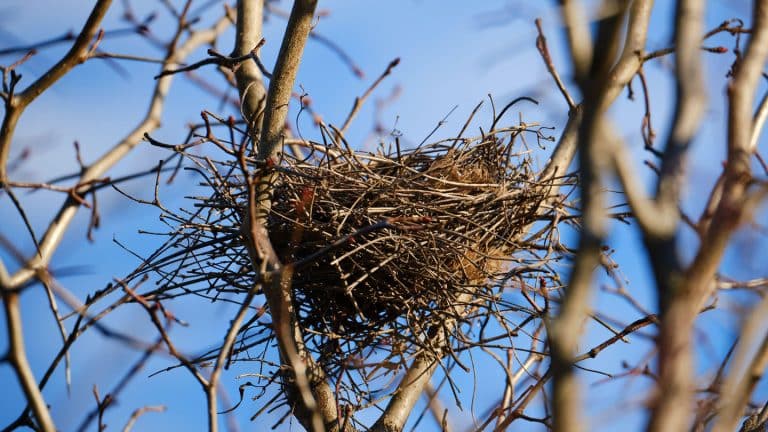All About Night Chirping of Birds: Reasons Behind
Don’t you think the melodies of birds in the morning are a delight to hear? But not all birds chirp in the morning. Many birds are nocturnal, meaning they are most active at night instead of daytime. This means some birds will continue to chirp even at night. The chirping of birds is significant for survival, including mating and communication.
While nocturnal birds are most active at night, and their chirping is more prominent, even the diurnal birds are seen chirping during the night. The blog aims to help you know more about birds chirping at night.
If you want to know what birds chirp at night, why birds chirp at night, and if there is any spiritual meaning of birds chirping during the nighttime, stay tuned to the blog till the end.
Why Are There Birds Chirping at Night?
It is not very uncommon to hear birds chirping at night. While most of us know birds for chirping at sunrise, you can hear different birds chirping even at night.
If you are fascinated about why birds chirp at night, here are the top reasons why bird enthusiasts justify the night chirping of birds.
1. To Find a Mating Partner
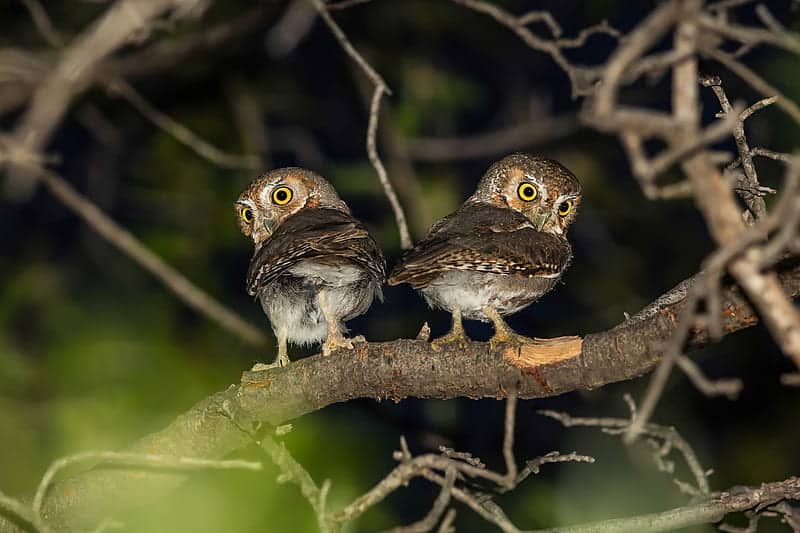
The most important reason why birds chirp at night is to find a mating partner for them. It is, in a way, similar to how we humans use our vocal sounds to communicate with other members of our species. Birds, using their vocal sounds, send messages to their species to find a mating partner for themselves. If you notice an increased chirping of birds in your area, it is probably because it is the breeding season of the local birds. While both night and day birds chirp to find a mating partner, nighttime renders less competition and less disturbance.
2. Territory Establishment
The Birds are mostly territorial, and to claim their territory, chirping helps them. Many male birds, like roosters, chirp loudly so that the other male birds don’t overcrowd them. The loud chirping is often used by birds to not let intruders into their territory.
3. Food
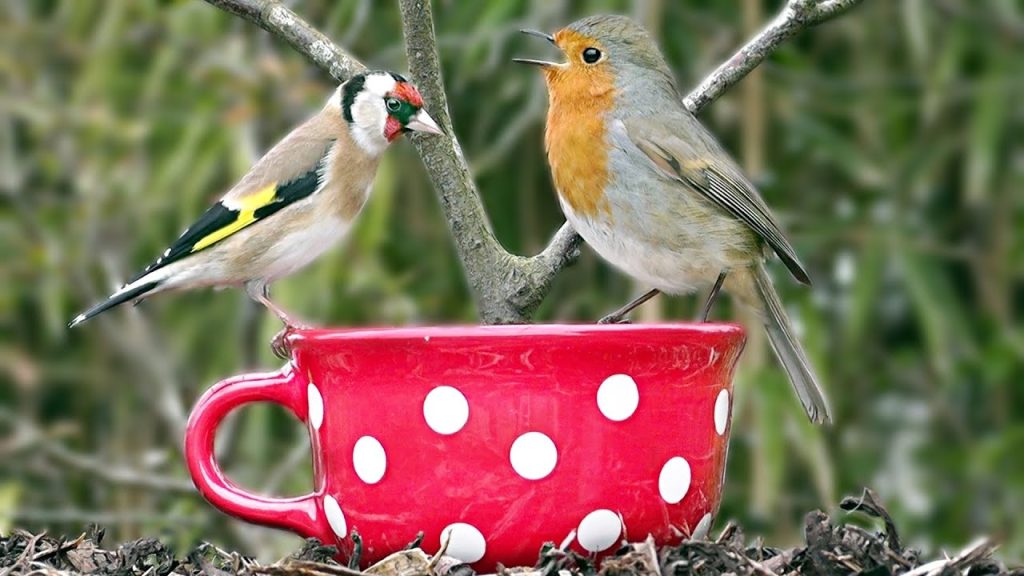
Finding food is not as easy as it is for us. For finding food, it is very tough for them. It is said that birds get excited when they find food for themselves. There are many reasons that experts answer why birds chirp at night when it is related to food. The birds chirp because they get excited about the food, and it is said that it also helps them to stimulate more energy. Additionally, it signals other birds to inform other birds about a new food source.
4. Calling Out for Danger
The birds use chirping for protection from predators. In this case, the chirping of birds will usually be more aggressive and louder. Some bird experts suggest that the birds have specific chirping for distinct predators, especially avian predators. The loud chirping of birds helps in two ways: by alarming the other birds and warning off the predators.
5. Groups of Flocks
Many birds travel and migrate in a group, migrating as a flock. The stars in the sky help the birds with directions. Birds traveling or migrating as a group chirp at night to make the flight call. The chirping is also done by birds that intend to join the group of birds. Additionally, the birds will chirp louder in new or unknown areas as a safety measure. If a group member gets lost, it chirps to reunite with the group.
6. Practice
Birds chirping at night are very important to make the mating call for adult birds. The musical sounds made by birds help them in their mating calls. Birds practice chirping at night to ensure their melodies are better and help them communicate with birds of the opposite gender distinctively.
7. Disorientation
The daylight birds, chirping in the daytime, are greatly affected by noise pollution, especially contributed by urban cities. Light pollution mistakes the abundant light present at night as the sunlight. This often makes the daytime birds sing even in the nighttime. For most birds, daytime has more noise pollution, making it easier to chirp at night.
8. Chirping of Baby Birds
Another reason that supports why birds chirp at night is that young birds need supervision and protection like all other animals. Other than nurturing sought by young birds, the other reasons include practicing singing and mimicking their parents’ sounds. Moreover, feelings like discomfort, fear, and hunger can make a baby bird chirp at night time.
What Birds Chirp at Night?
Here is a list of birds that chirp at night:
1. Mockingbird
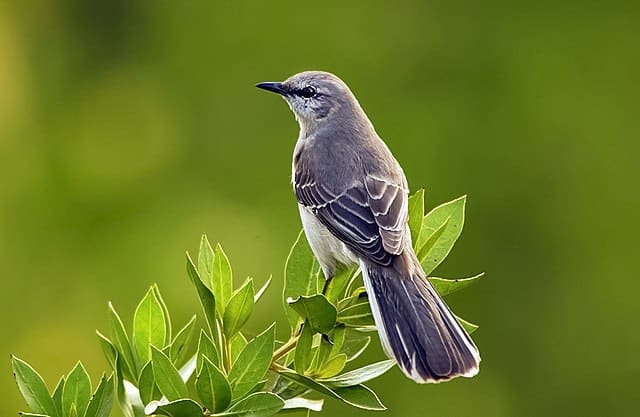
Two reasons why mockingbirds are very well known are protecting their territory and nocturnal singing. Mockingbirds are not typically nocturnals but continue to sing even in the nighttime. The bird’s chirping is so dreamy, but it has its role to serve for mating. At night, it allows the birds to find the mating partner by reducing the ambient sounds and lowering competition. The chirping of the birds, as suggested by the experts, suggests that it is either a young male bird looking for a mating partner or an adult one who has lost his mating partner.
2. Nightingales
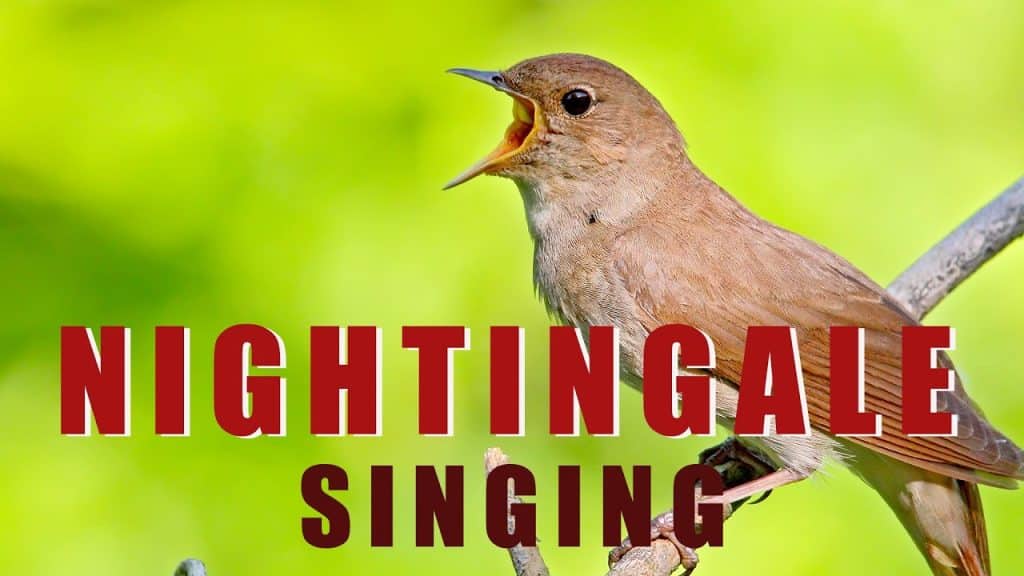
With a brown body, cream-colored chest belly, and a red tail, it is very easy to spot a Nightingale. Nightingales are seen chirping in the daylight as well, but they are mostly singing during the nighttime. The name of the bird itself suggests its night chirping, which means night songstress. The melodies of nightingales include trills, whistles, and gurgles.
3. Yellow-Breasted Chat
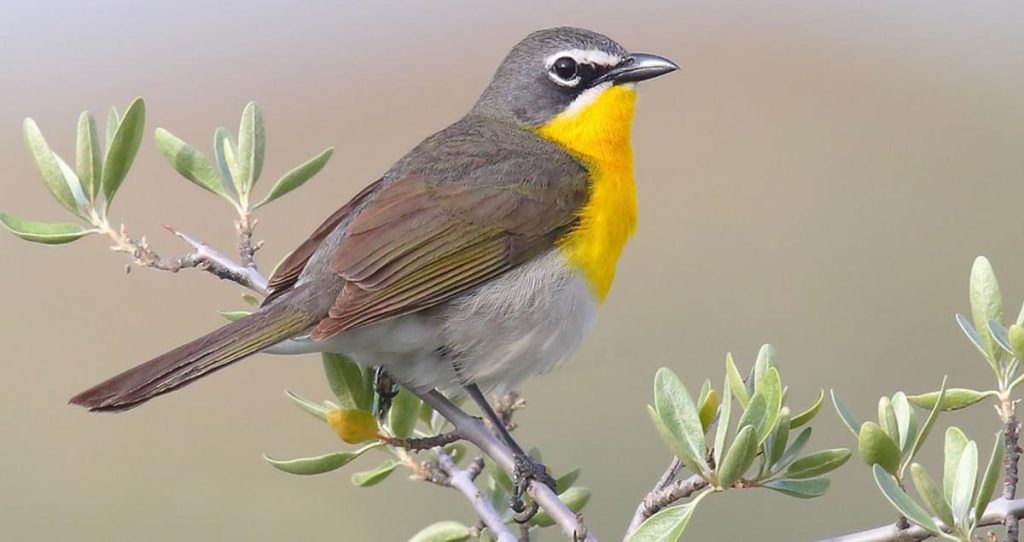
Yellow-breasted chat has a North American origin and is a warbler-like bird. The bird is brightly colored, including its yellow breast and throat. While this bird sings during the mornings and evenings, you can find them singing more prominently during the nights in their breeding season.
4. European Robin
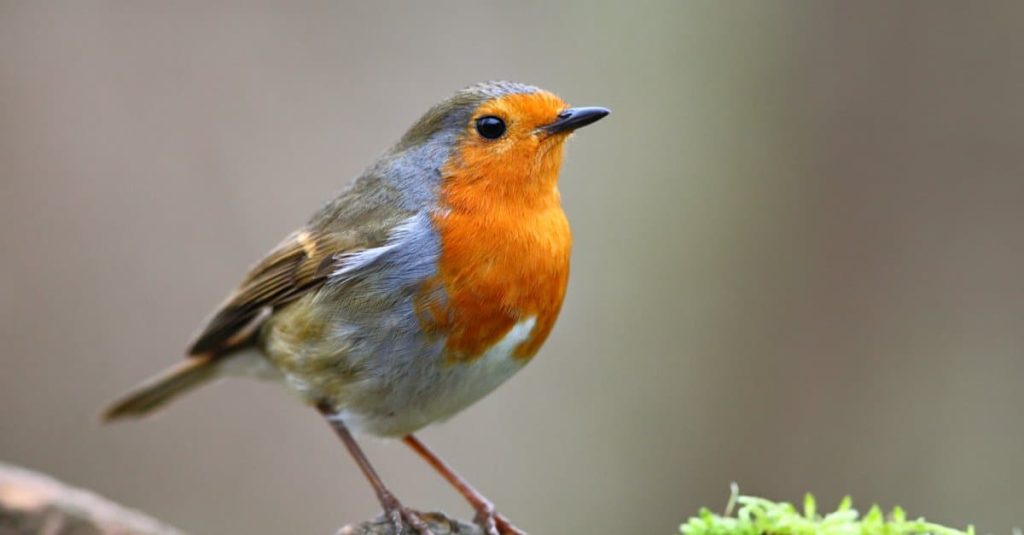
Commonly known as Robin or Robin Redbreast, European Robin is a small bird. These birds are considered to initiate the dawn chorus and are the last ones to stop singing at night. Because of their night chirping, they are often confused with nightingales. The distinctive features of this bird include an orange to red plumage on its body (face and upper chest.)
5. Upland Sandpiper
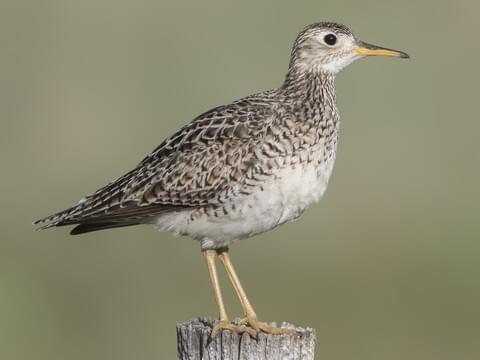
It is a bird with long legs and bills that have narrow wings with short wings. The birds have colors and patterns that resemble dead grass of brown, buff, and black colors. These birds provide melodies at night, combining trilling and whistles, mainly by male members. While male sandpipers are caught singing, the female birds can occasionally sing as well.
6. Hermit Thrush
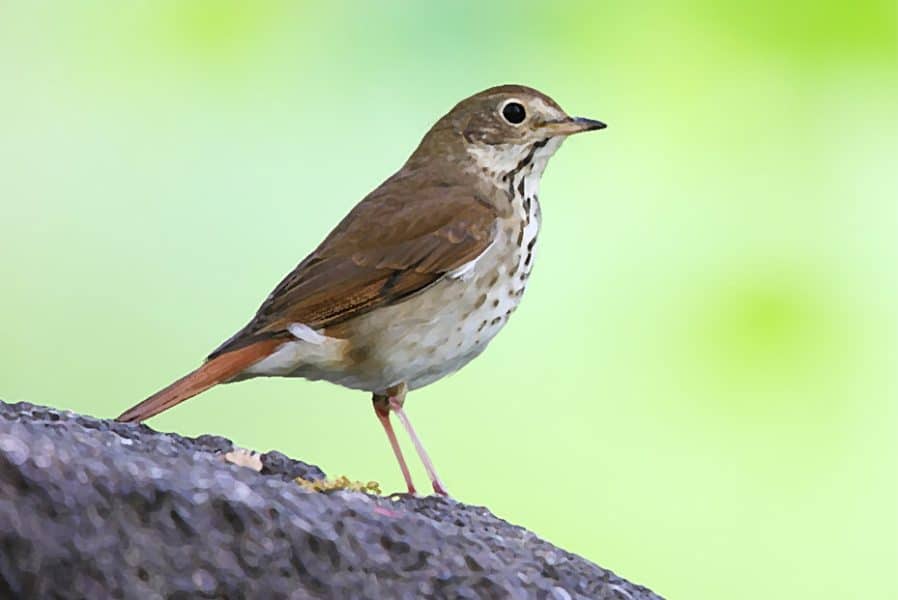
Popularly known for its foot quivering, Hermit Thrush is among the popular night songsters. The bird has a brown body (head and back) with a distinctive reddish tail. The throat and breast is covered with smudged pale spots. Its melody includes a low-pitched quoit, which often signals an attack or escape. Its song will often incorporate tunes from whistles with endings of echo-like tones.
7. Killdeer
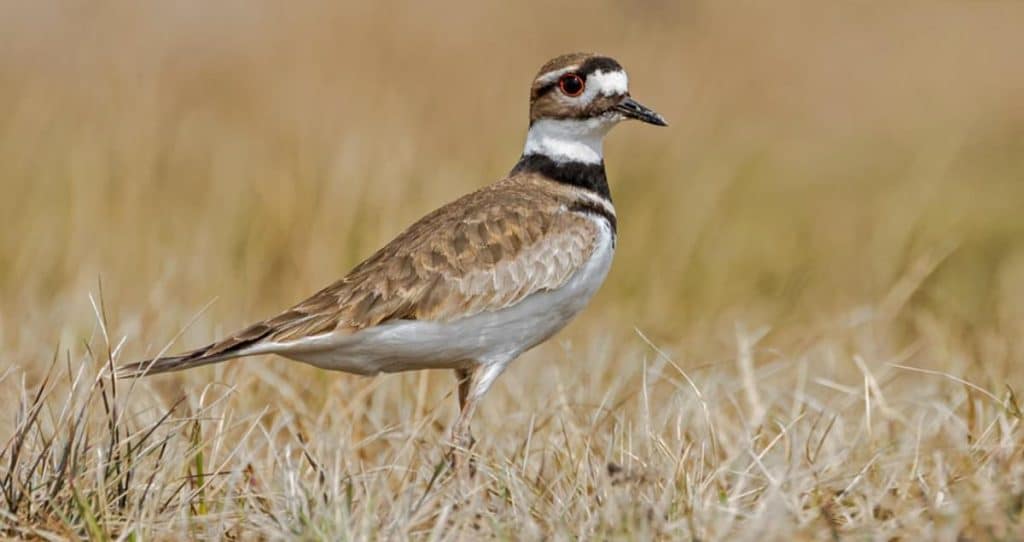
Killdeer is a shorebird that is most popular for its frantic piercing calls. The key features of the bird include a round and large head with large eyes. The bird has short bills with a long and pointy tail. The melodies of this bird have distinctive tones that sound like a chattering song. The interesting part here is that the birds can chirp as they are flying.
8. Black Rail
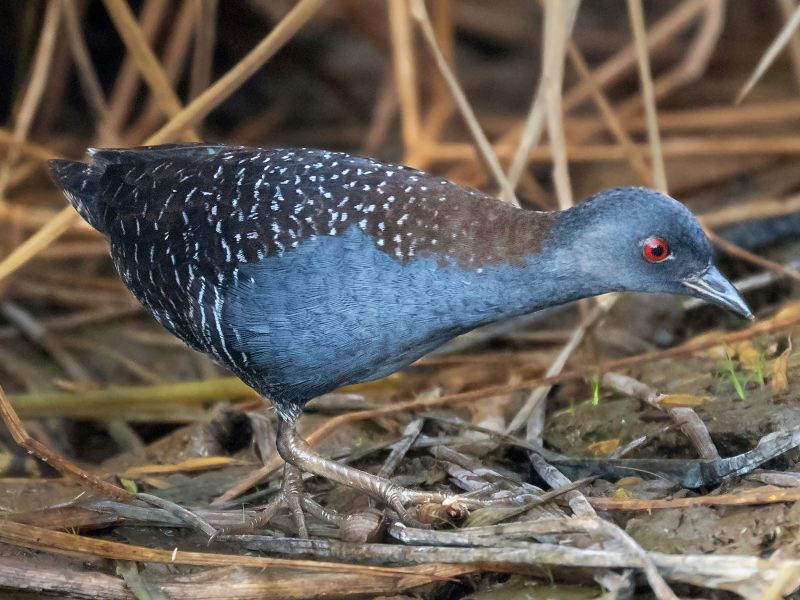
It is a small black-colored bird that is similar to a sparrow in its size. Found in southern and eastern areas of the US, the distinctive melody of the bird has a song-like call known as ki-ki-ki-kerr call, which is heard at nighttime.
9. Great Reed Warbler
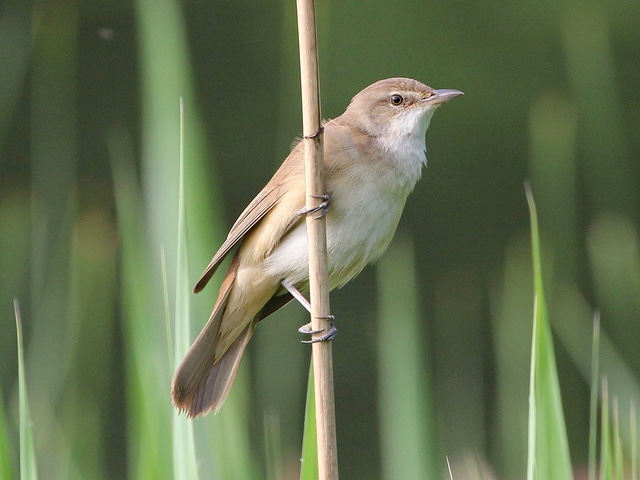
The Great Reed Warbler is another bird that chirps at night. Like different reed and sedge warblers, this bird species will be heard in the nighttime during its breeding period. Male birds are known to sing two types of songs, including short and long songs. The short songs sung by the male birds are stereo-typed with low-amplitude syllables used by males for territorial encounters. In contrast, the long songs consist of elements of high amplitude used to attract females for mating.
Top Most Nocturnal Birds
Among so many bird varieties, there exists a distinct feeding and behavioral pattern for each bird. While we are mostly acquainted with birds chirping in the morning and seeing the birds fly in the daytime, many birds are the most active at night. These birds, commonly known as nocturnal birds, are mostly active at the darker hours, including hunting, mating, and flying during the night.
To facilitate the survival of these birds at night, these birds have adaptations that help them significantly. Most nocturnal birds have dull plumage and camouflaged colors and patterns to help them get protection against predators. Apart from this, the nocturnal birds also have enhanced senses and better vision.
Here are five nocturnal birds you must know about:
1. Owl
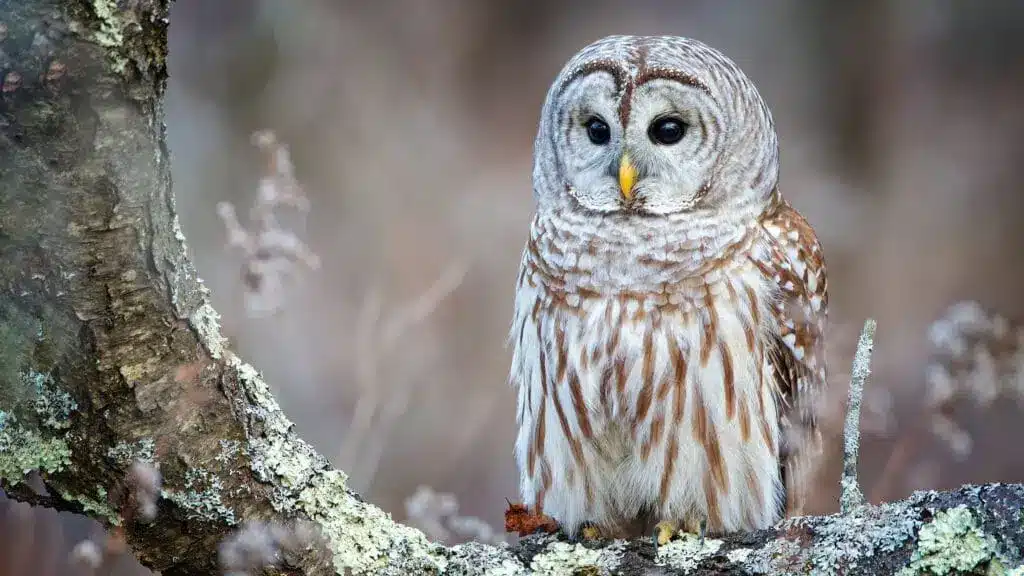
Owls are well-known nocturnal birds. Owls can be found in different varieties, among which most are nocturnal. It is incorrect to say that all owls are nocturnal, but most are nocturnal. Some of the varieties of nocturnal owls include Elf Owl, Tawny Owl, Boreal Owl, Ural Owl, and Little Owl.
Like other nocturnal birds, it is common to observe an owl hooting, screaming, and calling out at night. The owls are vocal at nighttime for different reasons, like establishing their property and protecting it. Other reasons include attracting owls of the opposite gender for mating and to warn of the presence of a predator species.
2. Black-Crowned Night Herons
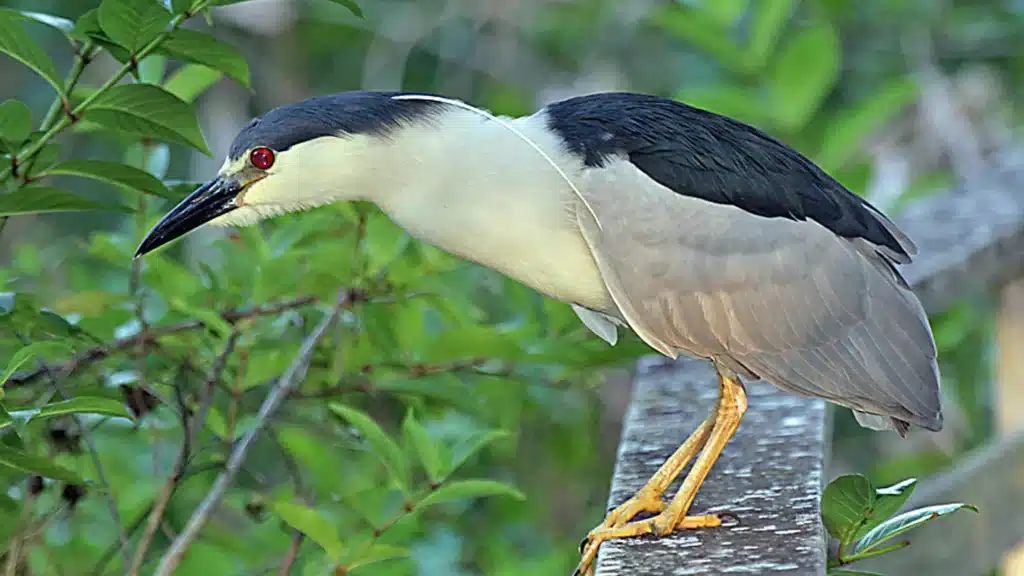
Black-crowned night herons are medium-sized nocturnal birds with black plumage and bills with yellow feet. These birds are mostly nocturnal and are the most active during the night or the dusk. The other varieties of heron are active in the daytime. One of the reasons Black-crowned night herons are active at night is because other birds for food dominate them in the daytime.
3. Nightjars
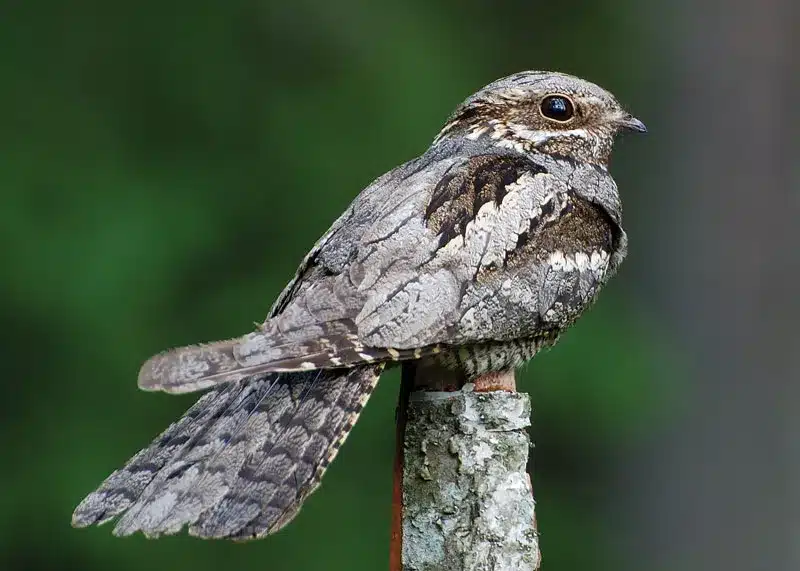
Nightjars have characteristic features like short legs and bills with long wings. The name itself represents the bird being more active during the nighttime. Nightjars, like other nocturnal birds, are most active near dawn and dusk. The night helps them to find prey for themselves. Firstly, the birds stay close to livestock in the dark to get insects as food. Additionally, insects like bugs are often found near light sources like glowing bulbs. This makes it easier for the nightjars to find food themselves. Not only will you see a nightjar looking for just food, but they also chirp at night.
4. Potoos
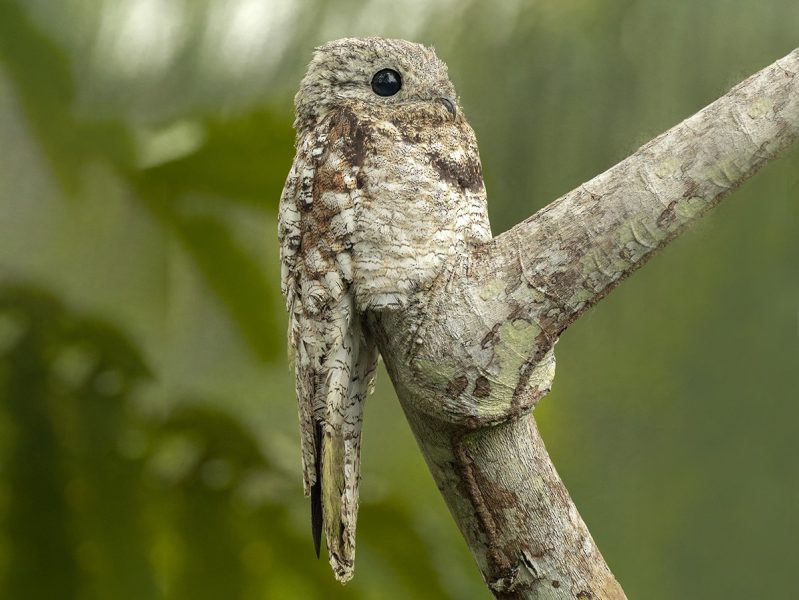
A potoo can be identified by its black, gray, and brown patterns that look very similar to a tree bark. This helps them in camouflaging, protecting them from predators. Being a nocturnal bird, potoo chirps mostly at night and sleeps during the daytime. The bird is very tough to be identified during the daytime as it looks similar to a branch. But the bird becomes more active during the night. The chirping of this bird at night is often talked about in many folktales. The bird finds its prey, moths and other insects, in the nighttime.
5. Night Parrot
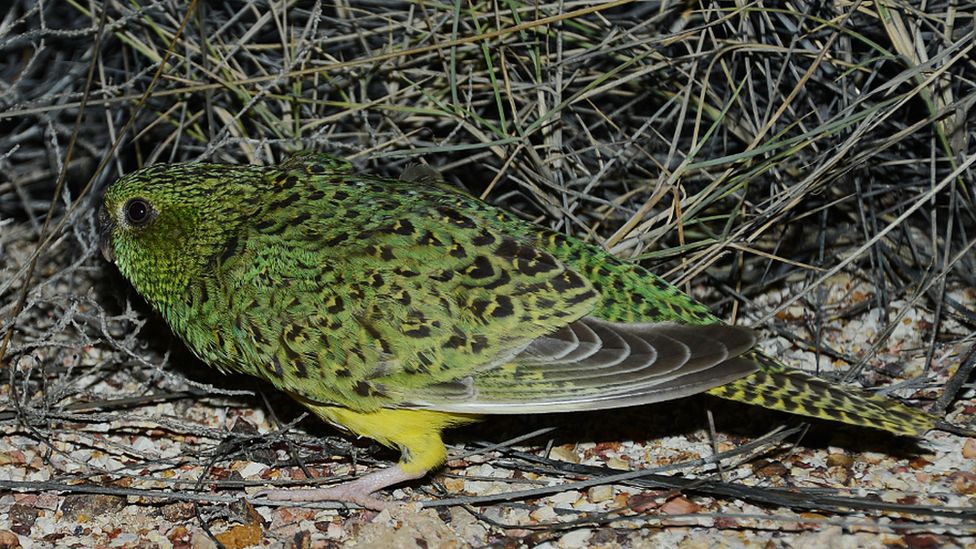
As suggested by its name, the night parrots are nocturnal birds. While parrots are mostly diurnals, two parrot varieties are nocturnal, i.e., Night Parrots (American) and Kākāpō (a distantly related bird in the parrot family). Commonly known as the Porcupine Parrot or Spinifex, the bird is a medium-sized bird with bright green feathers. The parrots have yellow and black spots and bars all over their body as a distinctive feature. It is an endangered species, which has made it difficult to study its feeding and behavior patterns.
Spiritual Meaning of Birds Chirping at Night
The birds chirping in the morning are the best natural alarms. If you are waking up to a bird chirping, you get a sense of calmness and serenity. And there is no better way to start your morning with. Birds chirping at night is very common as well, but it often is associated with a lot of spiritual meanings. Why do birds chirp at night, spiritual meaning?
Let us explore how all birds chirping at night are associated with spirituality.
- Hearing a bird chirp is never a bad omen. It is a sign and encouragement for your spiritual awakening. So, anytime you hear a bird’s melodies at night, proceed with a positive mindset rather than assuming it to be an omen.
- If you hear birds chirping at 1 AM, it means that the spiritual world is trying to connect with you. Because we are consumed by a lot of activities physically and mentally, this time is assumed to be perfect to attain your attention. The spiritual meaning of birds chirping at 1 AM is to awaken your spiritual senses. This is a sign for you to think thoroughly before making any choice. The bird is presumed to be your spiritual guide, encouraging you to connect with your spiritual self and protect you from the evil of the dark.
- Hearing birds chirping at 2 AM means your guardian angel is close to you. In the spiritual world, 2 AM is considered to be the warring time (a battle between the light and dark spirits). This is why the guardian angel is closer to you to protect you.
- We humans often have a weight that we carry throughout our lives. If you hear birds chirping at night, it is supposedly a wake-up for you to let go of the weights you carry and overcome the ties that bind you. Feel free to unload all the weights you carry.
- It is common for us to feel very uncertain about the flow of our lives. It can be confusion about what course you must pursue, a job opportunity you have, or a personal decision you have to make. If you hear birds chirping at night, it is assumed that the flow you are going with is the right path for you.
- Another spiritual meaning behind hearing birds chirping at night is a sign that you are not alone. It is a sign in the spiritual world that one must overcome the aggravating feeling of loneliness and sadness.
- Another common belief tied to listening to the birds chirp at night is the abundance of food. Abundance can be in education, career, love life, or personal life. You will excel in different parts of your life with many blessings.
- We often do not know if we should go to someone and trust his advice. If you hear birds chirping at night, it is a sign you must go to an advisor to attain clarity in your life. This will help you get a new perspective and a better understanding of the life situations you are going through.
Summing It Up
The chirping of birds in the nighttime is very common. If you have the same question about why birds chirp at night, here is your answer. They chirp for different reasons like a mating call, a flight call, establishing their territory, or simply as baby birds calling out for their parents.
Nightingales, owls, mockingbirds, sandpipers, killdeer, black rail, night herons, nightjars, and night parrots are a few birds that chirp at night. While there are scientific reasons for their chirping, many spiritual meanings have also been associated with hearing birds chirp at night.
Comment down and let us know the name of the bird you have heard chirping at night!

